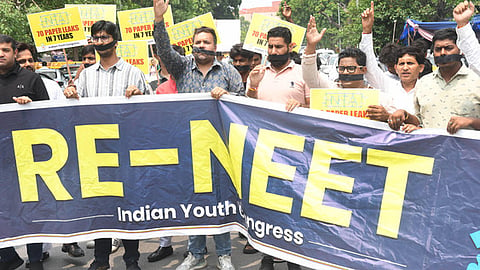

NEW DELHI: A petition has been filed in the Supreme Court seeking a review of its earlier order dated August 2, in which it had rejected pleas for holding NEET-UG 2024 afresh. The court had noted that "there was no systemic breach" warranting the cancellation of the exam.
The review petition was filed by Kajal Kumari, who is requesting the Supreme Court to reconsider and modify its August 2 order.
A review petition is typically filed by an aggrieved party requesting the court to reconsider its earlier order. Generally, review petitions are heard in a chamber hearing without the presence of parties, lawyers, or litigants. The same judges who issued the original order review the case and pass a decision, usually within 15-30 minutes.
In its August 2 verdict, the Supreme Court had stated that there was insufficient evidence to indicate a systemic leak or malpractice compromising the integrity of the examination, concluding that "there was no systemic breach" necessitating the cancellation of the exam.
On August 2, the Court passed a detailed judgment outlining seven directives for a robust, secure, and transparent examination system. While acknowledging that there was no systemic breach warranting the cancellation of the exam, the Court directed the implementation of several measures to ensure an unbiased and secure exam process.
A bench led by Chief Justice D.Y. Chandrachud had delivered the judgment after hearing a batch of petitions from students alleging malpractices and irregularities in the exam. The hearings took place over four days, involving petitioners, the Centre, the National Testing Agency (NTA), and other parties.
The Court directed rigorous checks throughout the examination process, including measures for question paper handling, storage, and enhanced identity verification at various stages. It also called for technological innovations to prevent impersonation and emphasized adherence to privacy laws. Chief Justice Chandrachud highlighted the need for the NTA to avoid inconsistencies in its handling of the NEET-UG 2024 exam, noting that such inconsistencies do not serve the interests of students.
The Court also expanded the scope of the K. Radhakrishnan expert committee, which was constituted by the government to address NEET-UG paper leaks and other irregularities. The committee was tasked with implementing seven steps to enhance the robustness of the exam process, including 1.Evaluation committee, 2. Standard Operating Procedure, 3. Review of the process for assigning exam centers, 4. Enhanced identity verification processes, 5. CCTV monitoring of exam centers. 6. Secure logistics providers to prevent tampering with paper, 7. A robust grievance redressal mechanism.
"The viability of using closed vehicles with real time locks rather than open e rickshaws to be considered," the CJI said.
The purpose of these directives was to deter and detect any malpractice in the exam process.
Pointing out that the expert committee must rectify the deficiencies in the exam system, the apex court said that if any student has any kind of personal grievance not related to the issues resolved in the judgement, they would be free to move to the respective High Courts.
The Court also reiterated that its conclusion was based on the absence of a systemic breach, with any leaks being limited to Patna and Hazaribagh.
On July 23, the Supreme Court had rejected pleas for a re-test, stating that detailed reasons would be provided later. In that order, the Court had observed that there was no data suggesting a "systemic breach" or that the "sanctity" of the examination was compromised by the two localized leaks of the question papers.